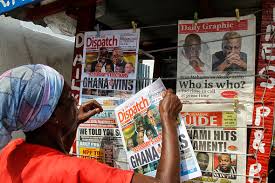The report that the government has announced the suspension of all payments of external debts pending an orderly restructuring of the affected obligations dominates the headlines of the Ghanaian press on Tuesday.
The Graphic reports that the government has announced a suspension of all payments of external debts pending an orderly restructuring of the affected obligations.
A statement dated Monday, December 19, 2022 issued by the Ministry of Finance stated that the suspension will include the payments on Eurobonds; commercial term loans; and most of Ghana’s bilateral debt.
The suspension, according to the statement, will, however, not affect the payments of Ghana’s multilateral debt, new debts (whether multilateral or otherwise) contracted after December 19, 2022 or debts related to certain short-term trade facilities.
“We are also evaluating certain specific debts related to projects with the highest socio-economic impact for Ghana which may have to be excluded. This suspension is an interim emergency measure pending future agreements with all relevant creditors,” parts of the statement read.
“Ghana is today faced with major economic and financial crisis, and its attendant social challenges. In 2020 and 2021, the covid-19 pandemic negatively impacted our fiscal and economic situation. Global risk aversion triggered large capital outflows, a loss of external market access and rising domestic borrowing costs.
“This year, 2022, the global economic shock induced by the Russian invasion of Ukraine has further adversely affected our economy just when it was beginning to recover from the pandemic. The combination of adverse external shocks has exposed Ghana to a surge in inflation, a large exchange rate depreciation and stress on the financing of the budget. These factors taken together have put the sustainability of our debt at risk.
.”To address these mounting challenges, we launched on Monday 5th December an invitation to exchange our domestic debt. The details of this domestic debt exchange are set forth in an Exchange Memorandum, available on https://mofep.gov.gh/news-and-events/debt-operations. This domestic debt operation is part of a more comprehensive agenda to restore public debt sustainability. Given the magnitude of the economic and social crisis that Ghana is confronted with, this domestic debt operation will not be enough to close the large financing gaps that Ghana faces over the coming years. The Government’s Debt Sustainability Analysis (DSA) has demonstrated that our public debt, both external and domestic, is unsustainable,” the statement said.
The newspaper says that Vice-President, Dr Mahamudu Bawumia, has lauded the existing cooperation between Ghana and the UK and expressed hope that the two countries will continue to work together and chart new grounds, especially in the area of climate change.
Dr Bawumia was addressing the seventh session of the UK-Ghana Business Council (UK-GBC) at the Jubilee House in Accra last Friday.
“I think the setting up of the UK-GBC makes a lot of sense and I am glad that we are continuing in the same spirit of cooperation and partnership between Ghana and the UK.
“In that context of cooperation, we have seen, between the two countries, a solid record of accomplishment thus far,” he added.
The UK-GBC was set up in 2018.
At the meeting were the UK Minister of State for Development and Africa, Andrew Mitchell; the UK Trade Envoy to Ghana, Baroness Kate Hoey, and the UK High Commissioner to Ghana, Harriet Thompson.
According to the Vice-President, the council had made some significant gains over the last six years, and mentioned some projects that were being supported by the UK government as expansion works on the Kumasi and the Tamale International airports and the Eastern Regional Hospital in Koforidua.
Others were the Children and Maternity Block at the Komfo Anokye Teaching Hospital (KATH); an Aqua Africa Water project, which he said was supplying critical drinking water to 16 towns across the country; the Obetsebi-Lamptey Interchange in Accra; phase two of the Kejetia Market project in Kumasi; the Bekwai Hospital and the Tema-Aflao Highway projects.
Mr Mitchell traced the beginning of his relationship with Ghana to when he was a young banker in the country in 1983, saying: “By our priority sectors, the UK-GBC has helped us target areas where we can collectively make the big difference.”
The Graphic also reports that Ghana Enterprises Agency (GEA) has disbursed about GH¢10 million to 103 small businesses that applied for a portion of the Ghana Economic Transformation Project (GETP) grant.
The beneficiaries were selected after meeting the rigorous criteria designed by the GEA, the World Bank and other development partners of the government.
The beneficiaries are mainly owners of small businesses in agro-processing, food and beverage, healthcare and manufacturing and cut across the country.They are receiving between GH¢20,000 and GH¢300,000 grant to support their operational costs, including the purchase of raw materials and equipment.
At an orientation and signing agreement ceremony for the beneficiaries in Accra on December 19, the Chief Executive Officer (CEO) of the GEA, Kosi Yankey-Ayeh, said the grant was designed purposefully to ensure that businesses were resilient and ready to help transform the economy.
She said the main objective of the grant was to strengthen the economy, build industries and rebuild the business ecosystem to deal with unforeseen shocks or challenges in the future.
She said the government negotiated with the World Bank and came up with the access to finance component dubbed; the Ghana Economic Transformation Project to support these businesses, especially those impacted heavily under the early COVID-19 era.
“Today, we are signing off the third batch of 89 beneficiaries of small and medium enterprises (SMEs) under the COVID-19 Response Grant Programme.
“This batch of beneficiaries is being supported with over GH¢37.8 million, and it is indeed a privilege for me to be here for the third time under the current phase of the programme,” she said.
GIK/APA


